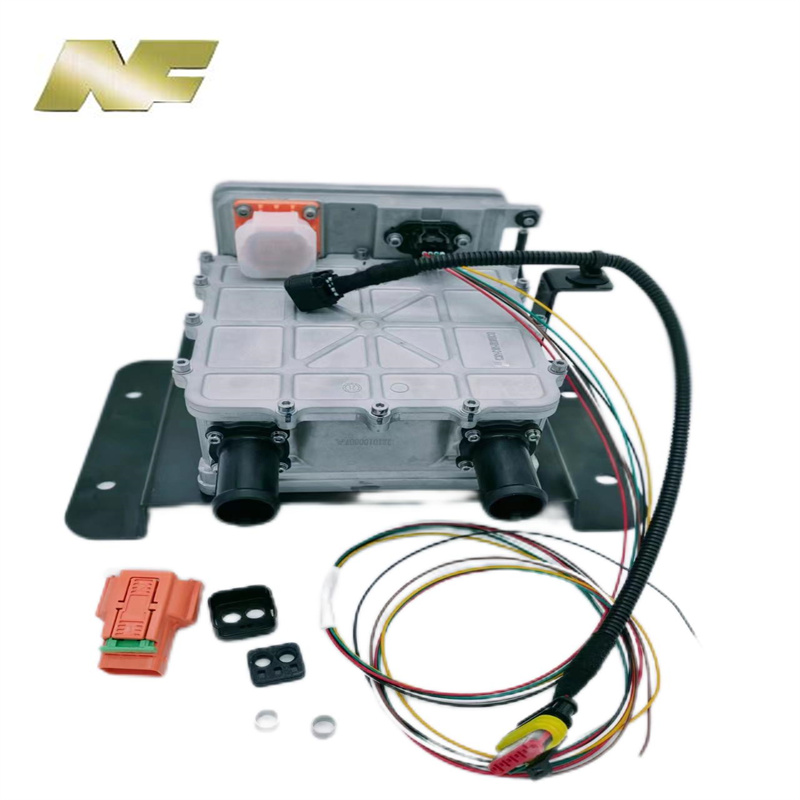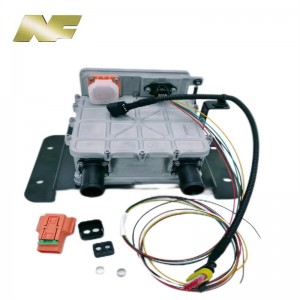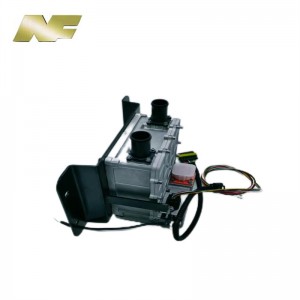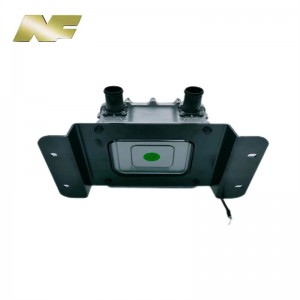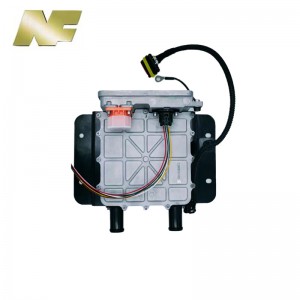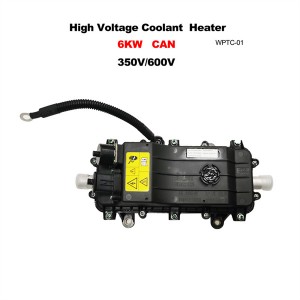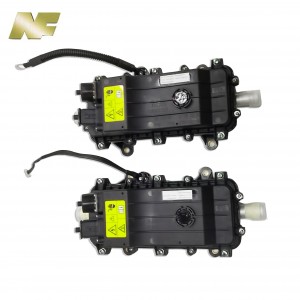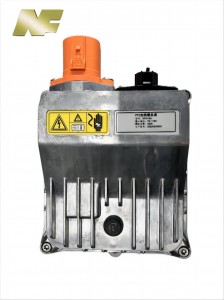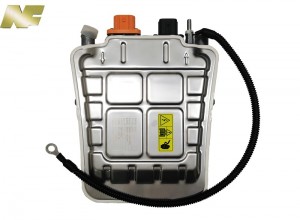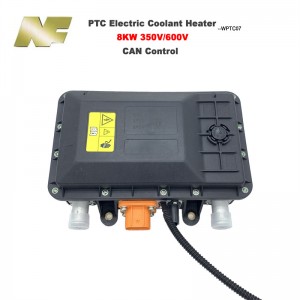NF 9.5KW HV Coolant Heater DC24V PTC Coolant Heater
Technical Parameter
|
Item |
Content |
|
Rated Power |
≥9500W(water temperature 0℃±2℃, flow rate 12±1L/min) |
|
Power control method |
CAN/linear |
|
Weight |
≤3.3kg |
|
Coolant volume |
366ml |
|
Waterproof and dustproof grade |
IP67/6K9K |
|
Size |
180*156*117 |
|
Insulation resistance |
Under normal conditions, withstand 1000VDC/60S test, insulation resistance ≥ 120MΩ |
|
Electrical properties |
Under normal conditions, withstand (2U+1000)VAC, 50~60Hz, voltage duration 60S, no flashover breakdown; |
|
Tightness |
Control side air tightness: air, @RT, gauge pressure 14±1kPa, test time 10s, leakage no more than 0.5cc/min, Water tank side airtightness: air, @RT, gauge pressure 250±5kPa, test time 10s, leakage not exceeding 1cc/min; |
|
High voltage side: |
|
|
Rated voltage: |
620VDC |
|
Voltage range: |
450-750VDC(±5.0) |
|
High Voltage Rated Current: |
15.4A |
|
Flush: |
≤35A |
|
Low pressure side: |
|
|
Rated voltage: |
24VDC |
|
Voltage range: |
16-32VDC(±0.2) |
|
Working current: |
≤300mA |
|
Low voltage starting current: |
≤900mA |
|
Temperature range: |
|
|
Operating temperature: |
-40-120℃ |
|
Storage temperature: |
-40-125℃ |
|
Coolant temperature: |
-40-90℃ |
Description
As technology continues to evolve, our reliance on fossil fuels is gradually being replaced by more sustainable and efficient alternatives. In the field of automotive engineering, this shift is highlighted by the emergence of electric vehicles (EVs) as a viable transportation option. As electrification grows, advanced systems are needed to ensure optimal performance, especially in cold climates. One of these revolutionary systems is the electric coolant heater, also known as the high-voltage PTC heater, which not only improves vehicle comfort but also plays a vital role in battery efficiency.
Learn about electric coolant heaters
Electric coolant heaters, often called high-voltage PTC heaters (positive temperature coefficient heaters), are an indispensable component in electric and hybrid vehicles. Its main function is to provide warmth to the cabin in cold weather conditions. Unlike conventional heaters that rely on engine waste heat, electric coolant heaters operate independently using electricity from the vehicle's battery or charging system.
How does an electric coolant heater work?
The coolant electric heater uses advanced technology and uses PTC heating elements to generate heat. PTC refers to a material with a positive temperature coefficient, that is, its resistance increases with temperature. This unique feature allows the electric coolant heater to self-regulate its heating output, ensuring consistent warmth without overheating.
When activated, the electric coolant heater draws electricity from the vehicle's energy source and directs it to the PTC element, which begins to heat. As the temperature increases, the resistance of the PTC material increases, limiting the current that can flow through it. This process effectively maintains a consistent and safe heating output, preventing any risk of overheating.
Advantages of EV coolant heaters
1. Improved vehicle comfort: One of the significant advantages of electric coolant heaters is their ability to quickly heat the cab, providing instant comfort to the occupants even before the conventional engine has warmed up. This eliminates the frustrating waiting times often associated with traditional heating systems, ensuring a pleasant driving experience from the moment you step into the vehicle.
2. Reduce battery consumption: Unlike traditional heating systems that rely on engine waste heat, electric coolant heaters operate independently, consuming electrical energy from the vehicle battery or charging system. However, modern electric coolant heaters are designed to be highly energy efficient, minimizing impact on the entire battery range. This efficiency allows EV owners to stay warm without compromising the vehicle's overall performance.
3. Environmentally friendly: Because electric coolant heaters rely entirely on electrical energy, they produce zero direct emissions. This sustainability advantage aligns with the larger goal of reducing our carbon footprint and moving to green modes of transportation. By choosing an electric heating system like an electric coolant heater, drivers are actively contributing to a cleaner, more sustainable planet.
4. Improve battery efficiency: Cold weather can significantly affect the performance of electric vehicle batteries. Extreme temperatures can reduce its efficiency and limit its range. However, an electric coolant heater can solve this problem by preheating the battery before use. Electric coolant heaters ensure optimal performance by keeping battery temperatures within an optimal range, resulting in efficient energy flow and extended battery life.
in conclusion
The electric coolant heater represents a major breakthrough in automotive heating technology with its high performance and environmental protection. As electric and hybrid vehicles increasingly dominate the road, this innovative system provides unparalleled passenger comfort without compromising energy efficiency. With enhanced battery performance and reduced carbon emissions, electric coolant heaters demonstrate progress towards a sustainable future. The adoption of this technology marks a substantial step towards achieving a greener transportation system and improving overall vehicle performance.
Note
The PTC coolant heater should be placed after the water pump;
ThePTC coolant heater should be lower than the height of the water tank;
The PTC coolant heater should be placed before the radiator;
The distance between the PTC coolant heater and the permanent heat source at 120°C is ≥80mm.
Principle: If there is gas in the waterway, it is necessary to ensure that the gas in the waterway can be discharged to ensure that there are no bubbles floating inside the heater (that is, it is forbidden to install the heater inlet and outlet downwards).
Application


Packaging & Shipping


Application


Hebei Nanfeng Automobile Equipment (Group) Co., Ltd is a group company with 5 factories, that specially produce parking heaters, heater parts, air conditioner and electric vehicle parts for more than 30 years. We are the leading auto parts manufacturers in China.
Our factory's production units are equipped with high tech machineries, strict quality,control testing devices and a team of professional technicians and engineers endorsing the quality and authenticity of our products.
In 2006, our company has passed ISO/TS16949:2002 quality management system certification. We also bagged the CE certificate and Emark certificate making us among the only few companies in the world acquiring such high level certifications.
Currently being the largest stakeholders in China, we hold a domestic market share of 40% and then we export them around the globe particularly in Asia, Europe and Americas.
Meeting the standards and demands of our customers have always been our top priority. It always encourages our experts to continuously brain storm, innovate, design and manufacture new products, impeccably suitable for the Chinese market and our customers from every nook of the world.
FAQ
1. What is an electric vehicle coolant heater?
The electric vehicle coolant heater is a device installed on an electric vehicle to heat the engine coolant before starting the vehicle. It helps reduce engine wear and improves fuel efficiency.
2. How does the electric vehicle coolant heater work?
Coolant heaters in electric vehicles use electronic components to heat the coolant. It connects to the vehicle's electrical system and can be activated remotely using a smartphone app or timer. Heated coolant circulates through the engine block, helping to warm up the engine and other components.
3. Why is it important to preheat electric vehicle engine coolant?
Preheating the engine coolant in an electric vehicle is crucial as it helps reduce stress on the engine during cold starts. By heating the coolant, the engine can run more efficiently, reducing emissions and improving overall performance. It also improves the range of electric vehicles in cold weather conditions.
4. Can the electric vehicle coolant heater be installed on any electric vehicle?
Yes, in most cases, an EV coolant heater can be installed on any electric vehicle. However, it is always recommended to consult the vehicle manufacturer or consult a professional installer to ensure compatibility and correct installation.
5. Can electric vehicle coolant heaters be used in all weather conditions?
Yes, electric vehicle coolant heaters can be used in all weather conditions. It is particularly useful in cold climates where ambient temperature can significantly affect vehicle engine performance and efficiency. However, it can also be used to maintain optimal engine temperatures in warm climates.
6. Are electric vehicle coolant heaters energy efficient?
Yes, electric vehicle coolant heaters are generally energy efficient. They use electricity from the vehicle's battery to heat the coolant, which is more efficient than using fuel to heat the engine. Additionally, some models allow for pre-programming and scheduling, ensuring the vehicle is warm and ready to go without consuming unnecessary energy.
7. How long does it take for the coolant heater of an electric vehicle to preheat the engine?
The time it takes for an electric vehicle coolant heater to warm up the engine may vary based on factors such as outside temperature and initial engine temperature. However, most electric vehicle coolant heaters can preheat the engine in about 30 minutes to an hour.
8. Are there any safety precautions when using an electric vehicle coolant heater?
While electric vehicle coolant heaters are generally safe to use, the manufacturer's instructions and safety guidelines must be followed. This includes proper installation by a professional, regular maintenance, and avoiding any modifications that may affect the heater's performance or compromise vehicle safety.
9. Can an EV coolant heater help extend battery life?
Yes, EV coolant heaters help reduce the load on the battery during cold starts by preheating the engine coolant. This helps extend the overall life of the battery and maximizes its performance and efficiency.
10. Are there any disadvantages or limitations to using an electric vehicle coolant heater?
One potential disadvantage of using an electric vehicle coolant heater is the additional energy consumption, which may slightly reduce the vehicle's overall driving range. Additionally, the initial cost of purchasing and installing a coolant heater may be a consideration for some. However, long-term benefits in engine performance, fuel efficiency and battery life often outweigh these considerations.

